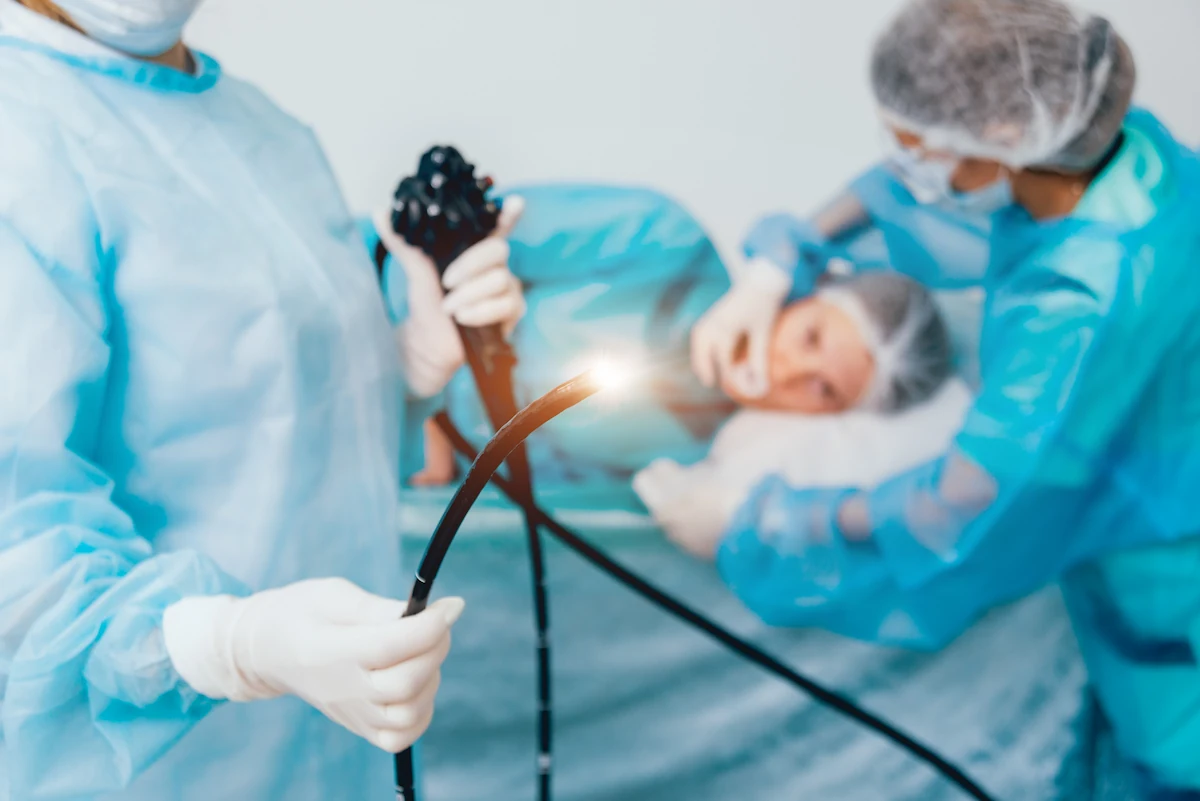Endoscopy
Upper GI endoscopy is performed during the diagnostic and preparatory phase of our patients’ bariatric surgery and reflux treatment plan.
Endoscopy
Upper GI endoscopy is performed during the diagnostic and preparatory phase of our patients’ bariatric surgery and reflux treatment plan.
What is an Upper Endoscopy?
An upper endoscopy, formally known as esophagogastroduodenoscopy (EGD) is a general surgery procedure that allows your doctor to visually examine the upper portion of your digestive system, including the esophagus, stomach, and duodenum (the upper part of the small intestine). During this procedure, a
Trusted Source
Upper Endoscopy
Mayo Clinic
Go to Source
small camera
attached to a long, flexible tube (endoscope) is passed through the mouth and throat, then images gathered by the camera are projected onto a nearby video monitor. Dr. Darrell Doucette is a certified bariatric endoscopist.
Why is an Upper Endoscopy Performed?
At Alabama Surgical Associates, we perform upper endoscopy on patients before and after bariatric surgery, and it is also performed as a stand-alone procedure. Tissue samples may be collected for biopsy during an endoscopy.
Upper GI endoscopy may be performed a diagnostic procedure to diagnose:
- Heartburn, acid reflux, GERD (gastroesophageal reflux disease)
- Benign and cancerous tumors
- Ulcers
- Swallowing disorders
- Upper GI tract infections
- Hiatal hernia
- Inflammatory conditions such as duodenitis, gastritis, and esophagitis
- Gastrointestinal conditions such as Crohn’s disease and celiac disease
Upper GI endoscopy may also be performed as treatment:
- To stretch digestive tracts
- To manage bleeding in the upper digestive tract
- To remove polyps or tumors
- To remove swallowed objects
- To perform
Trusted Source Upper GI Endoscopy Johns Hopkins Medicine Go to Source laser therapy
Preparing for your Upper Endoscopy
Before your upper GI endoscopy is scheduled, you will be fully educated about why and how the procedure is performed, as well as what you can expect during and after the procedure. You will be asked to stop eating and drinking for at least 8 hours before your endoscopy. You may also be asked to discontinue certain medications.
You will not be permitted to drive yourself home after the procedure, so please make arrangements for transportation.

What to Expect During an Upper GI Endoscopy
Upper endoscopy is an outpatient procedure performed under IV (intravenous) sedation. The procedure typically takes 10 minutes. Before the procedure, a mouthguard will be used to protect your teeth and to prevent you from biting down on the endoscope tube. You will lay on your left side as the endoscope is guided into your mouth. The tube will be guided down your esophagus, traveling through your stomach into your
Trusted Source
Upper Endoscopy
Cleveland Clinic
Go to Source
duodenum
. Dr. Doucette will be able to see images of these areas on a monitor in the room, and when the exam is complete he will remove the tube.
Recovery after an Upper Endoscopy
You will be able to return home the day of your upper endoscopy, following a brief recovery at our surgical center. It is normal to have a sore throat and be hoarse and/or have a cough for the first few days after an endoscopy, and you may also feel bloated and nauseous. Most patients are able to get back to their normal activities the following day.
Frequently Asked Questions About Upper GI Endoscopy
How long does endoscopy take?
This procedure generally takes roughly 10 minutes. With preparation and a brief recovery period, you should expect to be at our surgical center for 2 to 3 hours on the day of your endoscopy.
Is an endoscopy painful?
You will be sedated prior to your endoscopy. You should not feel pain, though some patients do report a sore throat afterwards.
Will I be able to eat after my upper GI endoscopy?
Yes. However, your throat will likely feel sore after the procedure, so you may want to focus on soft, cold foods that help you feel better.
Contact Us
To learn more about upper endoscopy, click below to contact us at our surgical center in Huntsville, Alabama.
Dr. Darrell Doucette has either authored or reviewed and approved this content.
Page Updated:
1 Mayo Clinic. Upper Endoscopy. Available: https://www.mayoclinic.org/tests-procedures/endoscopy/about/pac-20395197. Accessed June 2, 2023.
2 Johns Hopkins Medicine. Upper GI Endoscopy. Available: https://www.hopkinsmedicine.org/health/treatment-tests-and-therapies/upper-gi-endoscopy. Accessed June 2, 2023.
3 Cleveland Clinic. Upper Endoscopy. Available: https://my.clevelandclinic.org/health/treatments/4957-upper-endoscopy-procedure. Accessed June 2, 2023.